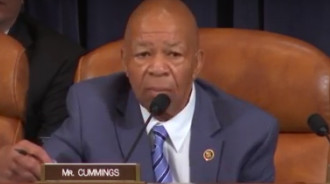WASHINGTON — Maryland Democratic Rep. Elijah Cummings on Thursday criticized Republicans on the Benghazi Select Committee for what he said was a politically-driven agenda against former Secretary of State Hillary Clinton.
“We need to come together to shift from politics to policy. That’s what the American people want, a shift from politics to policy,” Cummings declared in remarks at the opening of a marathon hearing at which Clinton testified about her handling of the 2012 attack on the U.S. embassy in Benghazi, Libya.
Cummings, the ranking Democrat on the panel, argued that many Republicans have taken a “hyper focus” on Clinton in order to cripple her presidential campaign. He noted that some Republicans admitted as much during media interviews.
There have been seven earlier investigations surrounding the Benghazi attack that took the lives of four Americans, including U.S. Ambassador Chris Stevens. Each examined whether Clinton ignored the requests for heightened security at the embassy in an ever-growing dangerous environment.
“The problem is that the Republican caucus did not like the answers they got from those investigations,” Cummings charged as Clinton sat at the witness table. “So they set up this select committee with no rules, no deadlines, and an unlimited budget. They set them loose, Madam Secretary, because you are running for president.”
Chairman Trey Gowdy, R-S.C., insisted during his opening statement that prior congressional investigations did not thoroughly complete necessary interviews and research into the Benghazi attacks, as well as Clinton’s actions leading up to and after the attacks.
Gowdy said that his committee’s goal is to find the truth, and that despite what Democrats said, Clinton is just one “of a hundred witnesses” aimed at finding the truth — and not the victim of a politically-driven attack.
“Self-governance comes with self-scrutiny, even of the highest officials,” Gowdy said.
Cummings cited many interviews where Republican presidential candidates and members of Congress criticized Clinton for her lack of interest or action in Benghazi.
“Everyone on this panel knows these accusations are baseless,” Cummings said. “None of the 54 witnesses the committee interviewed substantiated these wild Republican claims.”
Cummings argued during his opening statement that the release of the latest of Clinton’s emails did not provide any new information, but rather corroborated what the committee already knew and simply gave more details.
Cummings urged the panel not to make Benghazi a “political football,” but rather find the facts and do everything possible to make sure such an attack doesn’t happen again.
Tensions soared between Cummings and Gowdy right before the first break of the hearing as they argued about the release of Clinton adviser Sidney Blumenthal’s correspondence with then-Secretary Clinton. Blumenthal sent Clinton multiple emails with information regarding Libya.
Cummings argued that the entire transcripts should be released in order to uphold Gowdy’s goal to tell the “whole truth”.
Cummings asked Clinton the question that he said “has been asked many times and answered many times”: why were those security personnel requests in Benghazi denied?
Clinton responded that there was a protocol to follow in the State Department, and that many of “those requests and issues were rightly handled by security professionals in the department.”
Clinton claimed responsibility for what happened in Benghazi, but said she was not going to second guess the security professionals who were responsible for keeping diplomats safe abroad.
“I did not see them. I did not approve them. I did not deny them,” Clinton said of those heightened security requests.
Clinton also said that “there was no actionable intelligence on Sept. 11 (2012).”
Cummings said that the most recently obtained documents did not change this understanding of Clinton’s roles and actions.
“The problem is that Republicans keep asking the same questions over and over again, and pretend they don’t know the answer,” Cummings said.
Rep. Susan Brooks, R-Ind., showed the piles of emails Clinton sent and received about Libya in 2011 and 2012. She noted that Libya seemed to have fallen off Clinton’s radar in 2012, based on the 795 emails exchanged in 2011, and then the 67 in 2012—despite “the situation getting much worse in 2012.”
“Most of my work was not done on emails,” Clinton said.

